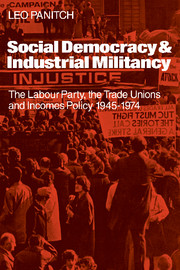 Social Democracy and Industrial Militiancy
Social Democracy and Industrial Militiancy Book contents
- Frontmatter
- Contents
- Preface
- List of Abbreviations
- Introduction
- 1 The 1945 Labour Government: the mixed economy and wage restraint
- 2 Incomes policy and Labour in opposition
- 3 The voluntary incomes policy agreement
- 4 The devaluation of voluntarism
- 5 The politics of wage freeze
- 6 The statutory incomes policy – Labour Government versus labour movement
- 7 ‘In place of strife’
- 8 Industrial militancy and political stagnation
- Conclusion
- Appendixes
- Notes
- Index
5 - The politics of wage freeze
Published online by Cambridge University Press: 07 October 2011
- Frontmatter
- Contents
- Preface
- List of Abbreviations
- Introduction
- 1 The 1945 Labour Government: the mixed economy and wage restraint
- 2 Incomes policy and Labour in opposition
- 3 The voluntary incomes policy agreement
- 4 The devaluation of voluntarism
- 5 The politics of wage freeze
- 6 The statutory incomes policy – Labour Government versus labour movement
- 7 ‘In place of strife’
- 8 Industrial militancy and political stagnation
- Conclusion
- Appendixes
- Notes
- Index
Summary
The prelude to the freeze
At the 1966 General Election Labour was returned with a bigger increase in its parliamentary majority than any party in Britain had ever won after a term of office: it gained forty-nine seats and lost only one and its majority was transformed from one of the most precarious under which a government could operate to one of the safest for which a government could hope. The parliamentary constraints which had impeded its plans for incomes policy since the fall of 1965 were thus removed overnight. Moreover, the Government, whatever its equivocations on the question during the election campaign, could reasonably interpret its victory as a vote of confidence in its incomes policy and face union opposition to the policy with more confidence than before. In a major policy speech at the Scottish Trades Union Congress three weeks after the election, and the day after that body had voted overwhelmingly against the reintroduction of the incomes policy legislation, the Prime Minister now boldly stated that the Government's economic strategy would not be settled ‘by a card vote which ever way it goes’, but by an unpalatable choice between wage restraint and unemployment:
We cannot compromise on our programme to get into balance by the end of this year. And speaking with all the authority at my command I have to tell you that the one thing that can stop us is a rise in industrial costs … So be clear, the Prices and Incomes Policy is not a whim of a Government Department, not a bright idea that has occurred to George Brown and me. […]
- Type
- Chapter
- Information
- Social Democracy and Industrial MilitiancyThe Labour Party, the Trade Unions and Incomes Policy, 1945–1947, pp. 106 - 139Publisher: Cambridge University PressPrint publication year: 1976


